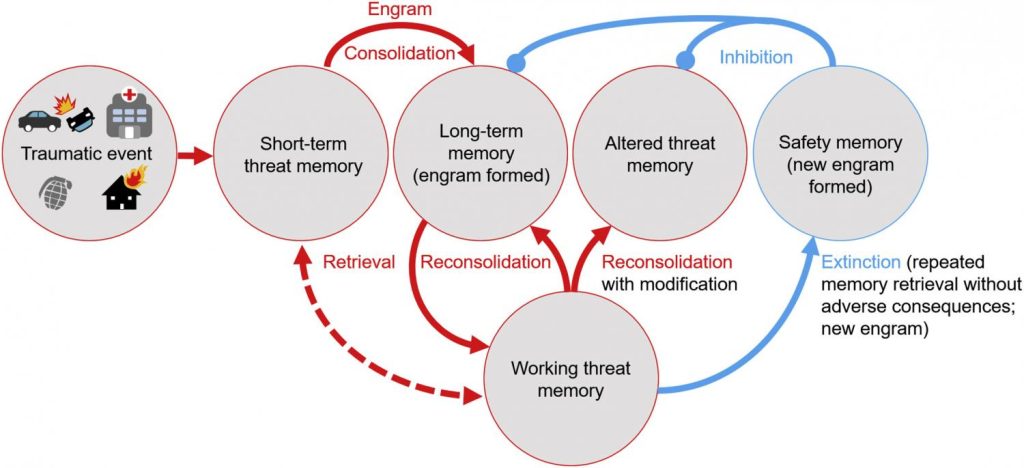I stumbled onto the concept of cellular memory in the most unexpected way—while deep-diving into one of Peter Attia’s brainy breakdowns[i] on fat cells. In his article “Fat Cell Memory” (https://peterattiamd.com/fat-cell-memory/), he explained how adipocytes don’t just expand and shrink with weight changes—they actually remember their max size, like stubborn balloons refusing to forget their heyday. That idea stopped me in my tracks. If fat cells can cling to their past like an ex that won’t let go, what else are our cells holding onto?
Curiosity got the better of me (as it always does), and before I knew it, I was neck-deep in a fascinating Cureus[ii] review article (https://www.cureus.com/articles/298798-the-role-of-cells-in-encoding-and-storing-information-a-narrative-review-of-cellular-memory). This paper went way beyond fat—it explored how all kinds of cells might encode and store information, including emotional trauma. That was my lightbulb moment. What if trauma isn’t just in your head, but also etched into your cellular code? And more importantly—what if we could rewrite it? That launched a whole new line of thinking (and research rabbit holes) on how to reverse trauma embedded in cellular memory—think epigenetic resets, therapeutic rewiring, maybe even nutritional strategies that help reboot the body’s inner hard drive. Science fiction? Maybe. But with everything we’re learning, it might just become science fact.
Cellular Memory and Trauma: Scientific Perspectives on Encoding, Impact, and Reversal
Understanding Cellular Memory
Cellular memory refers to the concept that cells can retain information from past experiences, influencing future responses. This phenomenon is evident in various biological contexts. For instance, fat cells exhibit a form of memory that affects how they respond to weight loss and gain. Peter Attia discusses how adipocytes (fat cells) can “remember” their maximum size, making it challenging to maintain weight loss, as the body’s physiology tends to revert to its previous state .
Beyond metabolic contexts, the concept extends to how cells might encode and store information related to experiences, including trauma. A narrative review in Cureus explores the role of cells in encoding and storing information, suggesting that cellular memory might play a part in various physiological and psychological processes .
Trauma and Its Imprint on Cellular Memory
Traumatic experiences can leave lasting imprints not only on psychological well-being but also at the cellular level. Research indicates that trauma can lead to epigenetic changes—modifications in gene expression without altering the DNA sequence. These changes can affect how genes related to stress responses are expressed, potentially leading to long-term physiological effects[iii] .(Wikipedia)
For example, studies have shown that individuals exposed to severe trauma, such as war or abuse, exhibit altered DNA methylation patterns in genes associated with stress regulation.

These epigenetic modifications can influence how the body responds to stress, potentially increasing vulnerability to conditions like PTSD[iv]. Moreover, such changes can be passed down to subsequent generations, indicating a transgenerational impact of trauma[v] . (Wikipedia, New York Post)
Additionally, trauma can affect cellular processes like autophagy—the body’s mechanism for clearing out damaged cells and regenerating new ones. Impaired autophagy has been linked to the accumulation of cellular waste, contributing to neurodegenerative diseases and other health issues[vi] .(News-Medical)
Hypotheses on Reversing Trauma-Embedded Cellular Memory
Given the profound impact of trauma on cellular memory, researchers are exploring potential methods to reverse these effects:
- Epigenetic Therapies: Since trauma can lead to epigenetic changes, therapies aimed at modifying these epigenetic markers are being investigated. For instance, certain drugs might target DNA methylation patterns to restore normal gene expression related to stress responses .(Wikipedia)
- Enhancing Autophagy: Promoting cellular recycling processes can help remove damaged cellular components resulting from trauma. Compounds that enhance autophagy might mitigate the cellular damage associated with traumatic stress[vii] . (ScienceDirect)
- Psychotherapeutic Interventions: Techniques like Progressive Counting and Memory Specificity Training aim to help individuals process and integrate traumatic memories, potentially alleviating their physiological impact[viii] .(Wikipedia)
- Pharmacological Approaches: Research into drugs that can modulate memory reconsolidation processes offers promising avenues. Such drugs might help in dampening the emotional intensity of traumatic memories, reducing their impact on cellular and psychological health[ix] .(WIRED)
Steps Toward Healing and Reversal
Addressing trauma’s impact on cellular memory requires a multifaceted approach:
- Early Intervention: Timely psychological support after traumatic events can prevent the consolidation of harmful cellular memories.
- Lifestyle Modifications: Regular physical activity, balanced nutrition, and stress-reduction techniques can promote overall cellular health and resilience.
- Therapeutic Support: Engaging in therapies that focus on processing and integrating traumatic experiences can alleviate both psychological and physiological symptoms.
- Medical Consultation: For some individuals, pharmacological interventions might be appropriate. Consulting healthcare professionals can help determine the best course of action.
This concept of cellular memory underscores the intricate connection between our experiences and physiological health. Trauma’s ability to imprint on our cellular processes highlights the importance of comprehensive approaches to healing. By combining scientific insights with therapeutic interventions, it is possible to mitigate the lasting effects of trauma and promote holistic well-being.
[i] https://peterattiamd.com/fat-cell-memory/
[ii] https://www.cureus.com/articles/298798-the-role-of-cells-in-encoding-and-storing-information-a-narrative-review-of-cellular-memory
[iii] https://en.wikipedia.org/wiki/Epigenetics_of_anxiety_and_stress%E2%80%93related_disorders
[iv] https://en.wikipedia.org/wiki/Epigenetics_of_anxiety_and_stress%E2%80%93related_disorders
[v] https://nypost.com/2025/03/19/health/stress-and-trauma-can-change-dna-and-the-dna-of-descendants/
[vi] https://www.news-medical.net/news/20230404/Promoting-cellular-recycling-in-the-brain-may-reverse-or-prevent-damage-from-traumatic-brain-injury.aspx
[vii] https://www.sciencedirect.com/science/article/abs/pii/S0889159123003422